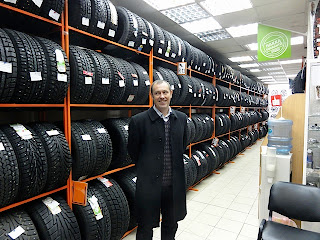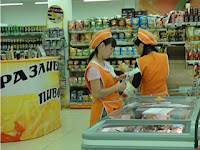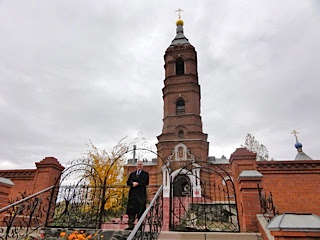Things are getting busy! Since my last blog entry, I've been to Moscow, given a talk on "Life in America," taught teacher training workshops for both secondary school English teachers and elementary school teachers who are learning English so they can teach it in the future, started taking private lessons in Russian, and guest taught English in two different classes each day (90 minutes each) at the Institute. I'm doing just what I came here to do! My hosts at the Institute are fully engaged with me and are making this a wonderful professional experience for me.
Topics that I will be teaching in class in the coming week include, grammar (use of the simple present tense vs the present continuous tense), American movie stars and their characteristics, the structure of the American educational system, American art and entertainment, diseases (their symptoms, treatment, and prevention), and phonetics!!
My quick, two day visit to Moscow last week was the fulfillment of a life-long dream. The Russian Fulbright Office invited the Fellows to an in-country orientation consisting of a day of meetings at the American Embassy and the Moscow Carnegie Center (a subdivision of the Carnegie Foundation for International Peace in Washington DC) and 60 of us attended. I went one day early for sightseeing, and I was absolutely giddy as I ran about Red Square taking in St. Basil's Cathedral, the Bolshoi Theater, and paying my respects to Lenin. None of my Russian friends understand why we want to see Lenin, and most of the Fulbrighters DID go to see him. Rumor has it that his body will no longer be on display as of some time next year. For me, it was an important thing to do if for no other reason than to contemplate the enormous influence and impact this man has had on the course of human history. I didn't get to go inside the walls of the Kremlin; it is closed to tourists on Thursdays, but I will when I return to Moscow for a few vacation days in mid-November.
It was interesting and stimulating to see colleagues that I had met in Washington DC last summer to learn how they are doing and hear how their projects are coming along. One professor is working on a project to clean up river pollution to prepare it for restocking with salmon to revitalize the caviar industry. Another is doing a comparative study of photographs from the 1920s in Russia and the USA. The largest contingency of Fulbrighters is a corp of approximately 60 recent college graduates who are teaching English in parts of Russia even more remote than Siberia in places whose names I can neither remember nor pronounce! We are individually bringing the face of the United States to Russia, having an impact on the world one person at a time. This brings great satisfaction to the experience.
In one recent class that I taught, I asked students in groups to create a list of stereotypes that Russians have about Americans, and also what stereotypes they thought Americans had about Russians. About Americans they said: Americans are friendly, always smiling, and confident. When required to include at leastone negative stereotype they added that Americans are sometimes sly, pretending to be the saviors of the world. They were immediately afraid that they had offended me! When asked about their sense of what Americans think of Russians, they were quick to respond. "Americans think we all drink vodka all day long, that it is always cold and winter here, and that wild bears walk in our streets downtown!" In fact, based on my experience to date here, I would have to conclude that Russians are teatotallers; they drink tea at every meal and during breaks throughout the day. I haven't seen a single person drinking vodka yet! While the weather is now turning cold - we had our first frost last week - recent days have been beautiful, with sunny clear afternoons climbing into the high 50s. Yes, I can see my breath in the morning, and the puddles are frozen over on the sidewalks when I set out to work. And no, I haven't seen any dancing bears, or any bears at all for that matter.


My most recent Russian lesson was on the topic of shopping, and I've been going to shops in the neighborhood to practice. Today I bought an iron. Alas, the one thing that is missing in my life is a washing machine. I do my laundry by hand in a plastic tub and dry it on the radiator, so my shirts really do need to be ironed! As I entered the store, I snuck a glance at my cheat sheet, took a deep breath, and asked the first idle clerk that I saw - in the best Russian I could muster - "Good afternoon. Do you have irons?" Without moving, the young woman replied, "Yes." I waited a moment, then asked, "Where?" This time,with the smallest movement of her head, she responded, "There." I made my way over to the irons. There were about 15 or 20 models to choose from, ranging in price from $10 to several hundred dollars, from the size of a travel iron, to a super duper unit almost the size of a vacuum cleaner! I looked the lower end models over and picked out a $12 iron that was self cleaning.

It looked like it would serve my purposes. I took another breath and hailed a different clerk, this one more helpful and talkative. I went through my now standard apology for not speaking Russian well. If I don't, they look at me funny, as if there is something wrong with me, wondering why I am being rude and not responding. At least, that is the tape that plays in my mind. When I tell them I don't speak Russian well, they usually smile and become very friendly and patient with me. She informed me that I had made a bad choice. The iron I had selected was no good. I needed the $22 model. It has a
)(*#&)Q(#* coating on the bottom that
@#%!^^&*. I asked her if they were made in Russia. She said that they were. (I find that it's much easier here to find things that are not made in China than it is in the US.) I took her advice. We went to her work station. She made some entries in the computer and printed out a form. She opened the box and unpacked the iron. She instructed me not to let the hot iron touch the plastic bag and then threw out the plastic bag. She showed me the instruction book and told me that this was the instruction book in the Russian language. She plugged in the iron to be sure it worked, showed me how to fill it with water with the included plastic cup, and demonstrated the steam and mist buttons. I was then asked to sign the invoice in three different places to acknowledge that she had tested the device, shown me the instructions, and I guess thrown away the plastic bag. I was then instructed to proceed to the checkout, where the clerk would stamp the warranty card (in four different places!) and we said goodbye to each other. At the checkout, my credit card didn't work (which also happens quite frequently), so I paid cash and was on my way. I don't speak Russian very well, but I'm working on it!








































